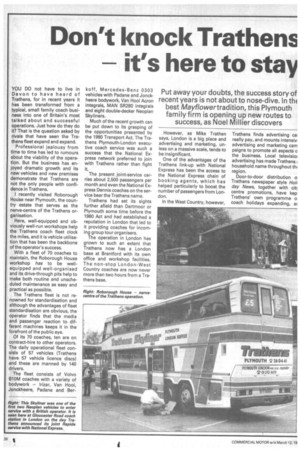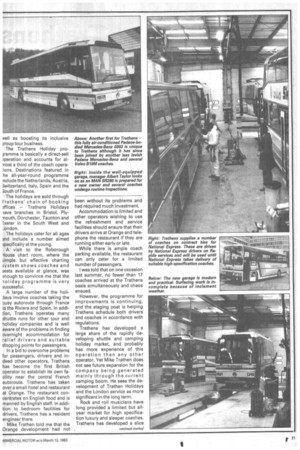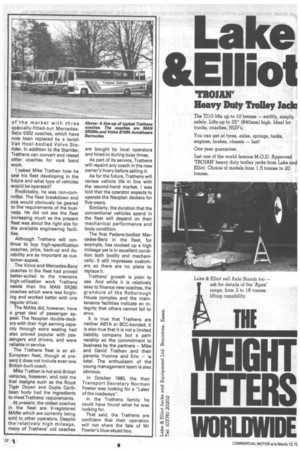Don't knock Trathens it's here to stay
Page 22

Page 23

Page 24

If you've noticed an error in this article please click here to report it so we can fix it.
YOU DO not have to live in Devon to have heard of Trathens, for in recent years it has been transformed from a typical, small family coach business into one of Britain's most talked about and successful operations. Just how do they do it? That is the question asked by rivals that have seen the Trathens fleet expand and expand.
Professional jealousy from time to time has led to rumours about the viability of the operation. But the business has enjoyed dramatic growth and its new vehicles and new premises demonstrate that Trathens are not the only people with confidence in Trathens.
I recently visited Roborough House near Plymouth, the country estate that serves as the nerve-centre of the Trathens organisation.
Here, well-equipped and obviously well-run workshops help the Trathens coach fleet clock the miles, and it is vehicle utilisation that has been the backbone of the operator's success.
With a fleet of 70 coaches to maintain, the Roborough House workshop has to be wellequipped and well-organised and its drive-through pits help to make both routine and unscheduled maintenance as easy and practical as possible.
The Trathens fleet is not renowned for standardisation and although the advantages of fleet standardisation are obvious, the operator finds that the media and passenger reaction to different machines keeps it in the forefront of the public eye.
Of its 70 coaches, ten are on contract-hire to other operators. The daily operational fleet consists of 57 vehicles (Trathens have 57 vehicle licence discs) and these are manned by 140 drivers.
The fleet consists of Volvo B1OM coaches with a variety of bodywork — lrizar, Van Hool, Jonckheere, Padane and Ber koff, Mercedes-Benz 0303 vehicles with Padane and Jonaheere bodywork, Van Hool Acron integrals, MAN SR280 integrals and eight double-decker Neoplan Skyliners.
Much of the recent growth can be put down to its grasping of the opportunities presented by the 1980 Transport Act. The Trathens Plymouth-London executive coach service was such a success that the National Express network preferred to join with Trathens rather than fight it.
The present joint-service carries about 2,500 passengers per month and even the National Express Dennis coaches on the service bear the Trathens name.
Trathens had set its sights further afield than Dartmoor or Plymouth some time before the 1980 Act and had established a reputation in London that led to it providing coaches for incoming group tour organisers.
The operation in London has grown to such an extent that Trathens now has a London base at Brentford with its own office and workshop facilities. The non-stop London-West Country coaches are now never more than two hours from a Trathens base. However, as Mike Trathen says, London is a big place and advertising and marketing, unless on a massive scale, tends to be insignificant.
One of the advantages of the Trathens link-up with National Express has been the access to the National Express chain of booking agents, which has helped particularly to boost the number of passengers from London.
In the West Country, however, Trathens finds advertising cal really pay, and mounts intensivi advertising and marketing cam paigns to promote all aspects o the business. Local televisior advertising has made Trathens household name throughout thi region.
Door-to-door distribution o Trathens newspaper style Heti day News, together with cit) centre promotions, have kep Trathens' own programme o coach holidays expanding, a: veil as boosting its inclusive iroup tour business.
The Trathens Holiday projramme is basically a direct-sell Teration and accounts for alhost a third of the coach operaions. Destinations featured in he all-year-round programme nclude the Netherlands, Austria, 3witzerland, Italy, Spain and the 3outh of France.
The holidays are sold through frathens' chain of booking )ffices — Trathens Holidays lave branches in Bristol, Plynouth, Dorchester, Taunton and Exeter in the South West and _ondon.
The holidays cater for all ages slid include a number aimed specifically at the young.
A visit to the Roborough -louse chart room, where the simple but effective charting system shows coaches and ;eats available at glance, was .ihough to convince me that the -ioliday programme is very successful.
A large number of the holidays involve coaches taking the busy autoroute through France to the Riviera and Spain. In addition, Trathens operates many shuttle runs for other tour and holiday companies and is well aware of the problems in finding overnight accommodation for relief drivers and suitable stopping points for passengers.
In a bid to overcome problems for passengers, drivers and indeed other operators, Trathens has become the first British operator to establish its own facility near the central French autoroute. Trathens has taken over a small hotel and restaurant at Orange. The restaurant concentrates on English food and is manned by English staff. In addition to bedroom facilities for drivers, Trathens has a resident engineer there.
Mike Trathen told me that the Orange development had not been without its problems and had required much investment.
Accommodation is limited and other operators wishing to use the refreshment and service facilities should ensure that their drivers arrive at Orange and telephone the restaurant if they are running either early or late.
While there is ample coach parking available, the restaurant can only cater for a limited number of passengers.
I was told that on one occasion last summer, no fewer than 17 coaches arrived at the Trathens oasis simultaneously and chaos ensued.
However, the programme for improvements is continuing, and the staging post is helping Trathens schedule both drivers and coaches in accordance with regulations.
Trathens has developed a large share of the rapidly de veloping shuttle and camping holiday market, and probably has more experience of this operation than any other operator. Yet Mike Trathen does not see future expansion for the company being generated mainly through the current camping boom. He sees the de velopment of Trathen Holidays and the London service as more significant in the long term.
Rock and roll musicians have long provided a limited but all
year market for high specification luxury and sleeper coaches. Trathens has developed a slice
of the market with three specially-fitted-Out MercedesBenz 0302 coaches, which have now been replaced by a lavish Van Hool-bodied Volvo Starider. In addition to the Starider, Trathens can convert and reseat other coaches for rock band work.
I asked Mike Trathen how he saw his fleet developing in the future and what type of vehicles would be operated?
Predictably, he was non-committal. The fleet breakdown and size would obviously be geared to the' requirements of the business. He did not see the fleet increasing much as the present fleet was about the right size for the available engineering facilities.
Although Trathens will continue to buy high-specification coaches, price, back-up and durability are as important as customer-appeal.
The Volvo and Mercedes-Benz coaches in the fleet had proved better-suited to the intensive high-utilisation work Trathens needs than the MAN SR280 coaches which were less forgiving and worked better with one regular driver.
The MANs did, however, have a great deal of passenger appeal. The Neoplan double-deckers with their high earning capacity through extra seating had also proved popular with passengers and drivers, and were reliable in service.
The Trathens fleet is an ailEuropean fleet, though at present it does not include even one British-built coach.
Mike Trathen is not anti-British vehicles, however, and told me that designs such as the Royal Tiger Doyen and Duple Caribbean body had the ingredients to meet Trathens' requirements.
At present, the oldest coaches in the fleet are V-registered MANs which are currently being sold to other operators. Despite the relatively high mileage, many of Trathens' old coaches are bought by local operators and hired-in during busy times.
As part of its service, Trathens will repaint any coach in the new owner's livery before selling it.
As for the future, Trathens will review vehicle life in line with the second-hand market. I was told that the operator expects to operate the Neoplan deckers for five-years.
Similarly, the duration that the conventional vehicles spend in the fleet will depend on their mechanical performance and body condition.
The first Padane-bodied Mercedes-Benz in the fleet, for example, has clocked up a high mileage yet is in excellent condition both bodily and mechanically. It still impresses customers so there are no plans to replace it.
Trathens' growth is plain to see. And while it is relatively easy to finance new coaches, the grandure of the Roborough House complex and the maintenance facilities indicate an integrity that others cannot fail to envy.
It is true that Trathens are neither ABTA or BCC-bonded. It is also true that it is not a limited liability company but a partnership so the commitment to business by the partners – Mike and David Trathen and their parents Yvonne and Eric – is total. The enthusiasm of the young management team is also obvious.
In October 1980, the then Transport Secretary Norman Fowler was looking for a "Laker of the roadways".
In the Trathens family he could have found what he was looking for.
That said, the Trathens are confident that their operation will not share the fate of Mr Fowler's blue-skyed boy.




























































































